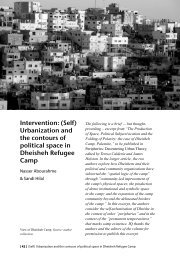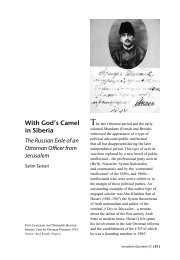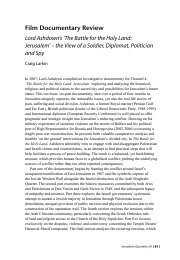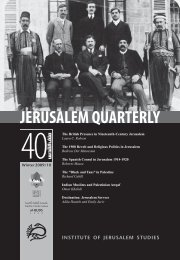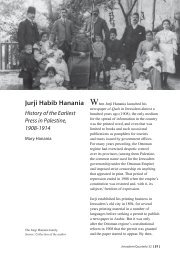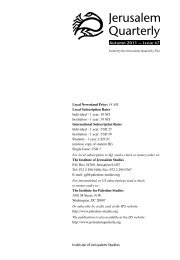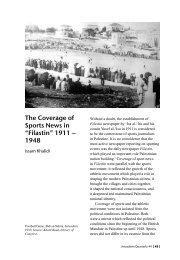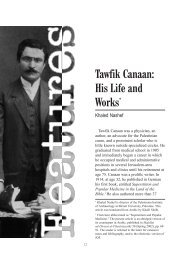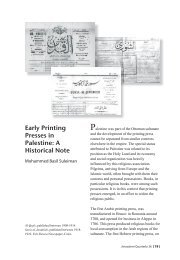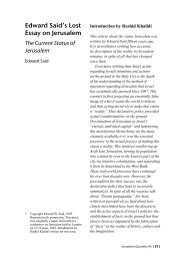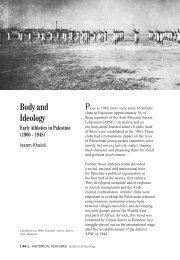Prisoner of War: Yusif Sayigh, 1948 to 1949 - Jerusalem Quarterly
Prisoner of War: Yusif Sayigh, 1948 to 1949 - Jerusalem Quarterly
Prisoner of War: Yusif Sayigh, 1948 to 1949 - Jerusalem Quarterly
Create successful ePaper yourself
Turn your PDF publications into a flip-book with our unique Google optimized e-Paper software.
Residents <strong>of</strong> the city <strong>of</strong> Akko moving <strong>to</strong>wards Qala’ prison after the fall <strong>of</strong> the city <strong>to</strong> Jewish forces on May 17, <strong>1948</strong>.Source: Before the Diaspora, p. 239.[ 18 ] FEATURES <strong>Prisoner</strong> <strong>of</strong> <strong>War</strong>: <strong>Yusif</strong> <strong>Sayigh</strong>, <strong>1948</strong> <strong>to</strong> <strong>1949</strong>
other convention from earlier wars. I knew what the rights and duties <strong>of</strong> prisoners <strong>of</strong>war were. I said again, We are prisoners <strong>of</strong> war. He said, Huh! What kind <strong>of</strong> prisoners<strong>of</strong> war are you? A prisoner <strong>of</strong> war is a soldier; he’s in uniform. He has arms, he has anumber. You have none <strong>of</strong> these things. What army are you with?And we couldn’t pretend that we belonged <strong>to</strong> any army.That night (we got there in the early afternoon), we were divided in<strong>to</strong> three or four<strong>of</strong> these big rooms [on] the floors <strong>of</strong> houses that had no walls. Before they broughtus there, they had built some wooden scaffolding, and guards sat on it with theirsubmachine guns pointing at us. There was no wired fence around us. But we wereheavily guarded.In the daytime, we could see Bethlehem far <strong>to</strong> the south, but we could not see much <strong>of</strong><strong>Jerusalem</strong>. Anyway, that night we slept without food or water, in the open. And howdid we sleep? I remember that a few <strong>of</strong> us wanted <strong>to</strong> bring flat s<strong>to</strong>nes or tiles <strong>to</strong> putas a pillow under our heads, but they wouldn’t let us have s<strong>to</strong>nes for fear that we’duse them against them. They were not much <strong>of</strong> an army. They were wearing differentuniforms. Some were in khaki trousers, others had grey flannel trousers, but most hadeither a jacket or trousers that was quasi-military in colour and shape. I personally–itwas May then, May 21st–I had a pair <strong>of</strong> grey flannels and a zip jacket. Luckily, it waswarm.All my life, I’ve suffered from a weak s<strong>to</strong>mach. But there I was in <strong>Jerusalem</strong>–youknow how many thousand feet above sea level it is?–without cover. What I did was<strong>to</strong> unzip my jacket, take it <strong>of</strong>f and put it on <strong>to</strong>p <strong>of</strong> my s<strong>to</strong>mach. And I slept like that.On the floor, tiles, cement. And I <strong>to</strong>ok <strong>of</strong>f my shoes and put them under my head as apillow. I had very nice crêpe shoes with a thick sole, and this provided some comfortfor my head.We stayed there for about six weeks, until the siege <strong>of</strong> <strong>Jerusalem</strong> was broken. In allthat time, nothing changed. Not a blanket, no pillow, nothing. They began giving ussome food, but guess what kind! The guards made their tea–we could see them doingit–on firewood. They had no gas fire, or anything <strong>of</strong> the sort. After they had finishedtheir tea, which they made in a saucepan, they would send the saucepans <strong>to</strong> the various‘rooms’ with the tea that they had already cooked once. They <strong>to</strong>ld us <strong>to</strong> make somefire; they let us collect wood from the immediate neighbourhood. Because it wasa building site, there were pieces <strong>of</strong> wood. They gave us cans that had held jam ortuna fish or whatever else <strong>to</strong> use as cups. There weren’t enough for all <strong>of</strong> us so, in thebeginning, each six had <strong>to</strong> use the same can. You know how fussy I am about usingother peoples’ cups!They said, Now this will be your tea. There was no sugar–they didn’t have sugarbecause they were under siege and sugar was rationed in West <strong>Jerusalem</strong>. And theysaid, We are going <strong>to</strong> get barrels <strong>of</strong> water, and you will have three litres per person per<strong>Jerusalem</strong> <strong>Quarterly</strong> 29 [ 19 ]
Before he was removed, he sent for me. I went <strong>to</strong> the gate, and said <strong>to</strong> the soldierwho came after me, I want four guards <strong>to</strong> go with me. He said, Why do you want fourguards? You usually have two.I said, I want four guards, I don’t want <strong>to</strong> be tempted <strong>to</strong> run away. So he gave me fourguards, and I went up.He said, Look, I know you well enough now, and you know me well enough. I knowyou are a gentleman, so if you are willing <strong>to</strong> give me your word <strong>of</strong> honour that youwill not try <strong>to</strong> run away, you can come up any time you want without guards. I said,Yes! To be killed by your soldiers pretending that I was running away? No! If you cantriple the number <strong>of</strong> guards, I’ll be happier.He got angry. Then he said, Look, you are a source <strong>of</strong> trouble, and you ought <strong>to</strong> knowthat we can punish you. I know from the record <strong>of</strong> your interrogations that you havefive brothers and a sister. If you want <strong>to</strong> see them again, you’d better behave! SomeArab bravado came in<strong>to</strong> me, and I said, Since you know I have five brothers, one lesswon’t matter much. There’ll be others in my place.Actually, I was really worried that he might carry out his threat, but I conveyed thats<strong>to</strong>ry <strong>to</strong> the Red Cross, and few weeks later he was removed.I remember that when we were on the way <strong>to</strong> the camp near <strong>Jerusalem</strong>, and later on,on the way <strong>to</strong> the camp by the sea, there was very little talking among us prisoners.The soldiers kept saying, Uskut! uskut! [Shut up!] if anybody tried <strong>to</strong> talk. They wereafraid that we might be inciting something. But if the people sitting there said anythingit was, Ya Allah! May God protect us! or My poor family!Then after we settled, and felt that there was no immediate danger <strong>of</strong> our beingkilled–especially after we moved <strong>to</strong> the camp by the sea–there was a lot <strong>of</strong> politicaldiscussion, especially between myself and the Egyptian army <strong>of</strong>ficers, the Syrianprisoners <strong>of</strong> war–a few <strong>of</strong> them–and the Palestinians that I became friends with. Asfar as I remember there were no Jordanians or Iraqis there. I think the Iraqis avoidedbeing captured because after they made a thrust, and cut Palestine in two reaching thesea, they got orders from Baghdad <strong>to</strong> withdraw <strong>to</strong> Jenin. This withdrawal cost themmore casualties than the actual takeover <strong>of</strong> that <strong>to</strong>ngue <strong>of</strong> land that cut Palestine inhalf. So they were not taken prisoner, as far as I know.The main subject <strong>of</strong> discussion was whether or not our side had a chance <strong>of</strong> winningthe war. I think most people extrapolated their own situation as prisoners <strong>of</strong> war <strong>to</strong>their general expectations. Here we were, thousands <strong>of</strong> prisoners. It meant that theArab nation itself was defeated, a prisoner <strong>of</strong> war itself. It couldn’t do anything. Butwhat shocked me, I remember clearly, was how the <strong>of</strong>ficers, instead <strong>of</strong> discussingthe question in terms <strong>of</strong> balance <strong>of</strong> power and military preparedness, either <strong>to</strong>okconsolation in quoting verses from the Qur’an, such as Allah byahmi or Allah kabir[ 24 ] FEATURES <strong>Prisoner</strong> <strong>of</strong> <strong>War</strong>: <strong>Yusif</strong> <strong>Sayigh</strong>, <strong>1948</strong> <strong>to</strong> <strong>1949</strong>
[God protect us, or God is great] or indulged in expressions <strong>of</strong> bravado, that withoutdoubt we would win eventually.But everybody’s morale dropped when the first armistice was announced. 5 The Jewslooked terribly happy. It lasted for several weeks, that armistice, and the Israelismade good use <strong>of</strong> it militarily. The work gangs were used <strong>to</strong> make trenches andfortifications, which is against the laws <strong>of</strong> war. <strong>Prisoner</strong>s <strong>of</strong> war are not supposed <strong>to</strong>be used in military effort. Those who had some experience with weapons saw newtypes they hadn’t seen before. They saw boxes <strong>of</strong> machine guns with markings thatshowed they were quite different from the more primitive types that had been usedat the beginning, many <strong>of</strong> which had been produced in Israel itself. Now they wereimporting weapons from East Europe and elsewhere.My own feeling was that it was wrong <strong>to</strong> accept the ceasefire, essentially becausethe Israelis wanted it <strong>to</strong> rearm, and make new plans based on the positions they hadalready acquired. I had a feeling that our side was not rearming, a feeling that wasconfirmed later on by military people outside. There were many s<strong>to</strong>ries, for instance,the fall <strong>of</strong> Lod and Ramleh. After their fall, we had hundreds coming in as prisoners<strong>of</strong> war. They picked up all the young men, and treated them as prisoners <strong>of</strong> war. Thesepeople <strong>to</strong>ld us how the Arab Legion had just deserted them, left them <strong>to</strong> their fate, andmoved eastward. All this made me feel that we were not going <strong>to</strong> use the Armisticeproperly <strong>to</strong> get more arms (apart from the fact that we didn’t have the money that theother side had <strong>to</strong> import arms). Whereas the Arab governments, except for Syria andLebanon, <strong>to</strong>ok orders from the British, the Israelis did not. Instead they got supportfrom the British and Americans.We went on for months until winter came. The tents were very bad; they leakedheavily. I began <strong>to</strong> have a very severe pain in my back. Two or three times, underheavy rain, the whole tent fell on <strong>to</strong>p <strong>of</strong> us–at night, with its big poles. We’d get upand clear ourselves, and try <strong>to</strong> pick it up. In the end, the pain was so much that Icouldn’t move. Much later, it was found <strong>to</strong> be a slipped disc, but then we didn’t evenknow the word. Three or four weeks <strong>of</strong> awful pain like that, and all they gave me wasfour aspirins, and then only on the last day before the Red Cross came <strong>to</strong> see me, t<strong>of</strong>ind out why I wasn’t contacting them. I stayed flat on my back. I used <strong>to</strong> pee in a tin,and this Sakkab boy used <strong>to</strong> take it and pour it out. But when I had <strong>to</strong> do the otherthing, it would take me 10 or 15 minutes <strong>of</strong> rising slowly, slowly <strong>to</strong> be able <strong>to</strong> standupright, and walk.I didn’t get my first letter from my family until three or four months after being takenprisoner. It was from my mother. All that we were allowed <strong>to</strong> write was a very simpleformula, nothing that could be a code. My mother was always confident, saying Iknow God will keep me alive until I see you. Don’t worry about me, I’m not going <strong>to</strong>die before you come out. I have the letters with me still.<strong>Jerusalem</strong> <strong>Quarterly</strong> 29 [ 25 ]
Then there were the attempts at escape. A number <strong>of</strong> prisoners managed <strong>to</strong> escape.Two <strong>of</strong> these attempts are worth mentioning. One was just before a Muslim feast whenthe prisoners were allowed <strong>to</strong> stay late outside the tents, and sing religious chants.They <strong>to</strong>ld me that this was going <strong>to</strong> be the night when 24 <strong>of</strong> them would try <strong>to</strong> escape.I said, It’s very risky; I’m sure it will cost many lives. It’s your decision, but I’d hate <strong>to</strong>see you nice young men getting killed. The nearest haven was Tulkarem, estimated <strong>to</strong>be 18 kilometres away. To walk 18 kilometres was <strong>to</strong> risk being met by patrols.They said, Twenty-four <strong>of</strong> us have sworn <strong>to</strong> go <strong>to</strong>gether. Their plan was <strong>to</strong> sit in circlesnear one <strong>of</strong> the watch<strong>to</strong>wers where the barbed wire had a little gap, so that a mancould slip under. I said, Why under the watch<strong>to</strong>wer? Why not somewhere far away?They said, Ah, that’s deliberate because we want <strong>to</strong> make him drunk!I said, What do you mean, make him drunk! He’s way up there 12 meters above you.They said, No, not that way. We are going <strong>to</strong> chant. There are 60 <strong>of</strong> us, and 15 willchant the same chant: Allah hayy, Allah hayy, Allah hayy. For hours! And when thefirst 15 s<strong>to</strong>p, the next 15 will start.Sure enough–I was watching from my tent–I could see the whole thing happening. Theguard was very curious at first, sitting, watching and shaking his head: What are theseAfricans doing chanting like that?! Then you could see his head was drooping, andthen he went <strong>to</strong> sleep. The others who did not escape that night <strong>to</strong>ld me they saw hissubmachine gun leaning against his thigh, on his chair. Then the 24 who had decided<strong>to</strong> leave slipped under the wire, while the others went on singing.Many months later, when I was out, I made inquiries and found that only six or seven<strong>of</strong> them succeeded in escaping. The others were either captured or killed. According<strong>to</strong> the rules <strong>of</strong> war, they should be taken back <strong>to</strong> a stiffer POW camp, where security ishigher. If a prisoner <strong>of</strong> war is caught escaping, he’s ordered <strong>to</strong> s<strong>to</strong>p, and if he doesn’ts<strong>to</strong>p you shoot. But if he s<strong>to</strong>ps, you ought <strong>to</strong> take him back.A second incident <strong>of</strong> escape involved many more people. It was not a real escape–arumour circulated that a number were going <strong>to</strong> be released for health reasons. And‘bad health’ was never defined. As it turned out later, a new security <strong>of</strong>ficer spreadthis rumour so that people would bribe him <strong>to</strong> put them among those who qualifiedfor release. Ahmad Abed al-Khalek was one <strong>of</strong> those who bribed him. I said <strong>to</strong> him,You won’t get away with it. It could be a trick. He said, Well, it’s only 15 pounds;I’m going <strong>to</strong> pay it. And he did. At the very end when we were released from anothercamp–this is just <strong>to</strong> complete this s<strong>to</strong>ry–Ahmad <strong>to</strong>ld me (because he was released aweek or so after me) that they held him back for interrogation, as a witness, as one <strong>of</strong>those who bribed that <strong>of</strong>ficer. The <strong>of</strong>ficer received five or six years <strong>of</strong> prison for havingaccepted bribes.The only interesting s<strong>to</strong>ry about this ‘escape’ was that one <strong>of</strong> the Egyptian <strong>of</strong>ficers,Muhammad Annan, came <strong>to</strong> me and said, I want <strong>to</strong> go out with these sick prisoners. 6[ 26 ] FEATURES <strong>Prisoner</strong> <strong>of</strong> <strong>War</strong>: <strong>Yusif</strong> <strong>Sayigh</strong>, <strong>1948</strong> <strong>to</strong> <strong>1949</strong>
But if they recognise me as an Egyptian <strong>of</strong>ficer, they are not going <strong>to</strong> let me. I want <strong>to</strong>borrow a kombaz. I found him somebody with a kombaz his size. He wanted <strong>to</strong> changehis face, so he grew a moustache. Then he said, I want my eyes <strong>to</strong> look smudged. I askedone <strong>of</strong> the work gangs <strong>to</strong> get some fig leaves, and <strong>to</strong>ld him <strong>to</strong> rub his eyes with them,and sure enough, two or three days later, he was crouched there with a hundred others,all claiming <strong>to</strong> have hernias, or ingrown <strong>to</strong>enails or whatever. He was there because <strong>of</strong>his trachoma. We gave him a different name, the name <strong>of</strong> somebody who was willing<strong>to</strong> give him his name. They waited hour after hour for the buses <strong>to</strong> come, but nothinghappened. In the end they were all ordered back <strong>to</strong> their tents. It didn’t work.There were other escapes, smaller groups. Some <strong>of</strong> them got away. The earth was notrocky. It was agricultural earth, and they could dig under it. They always somehowmanaged <strong>to</strong> find <strong>to</strong>ols. We had <strong>to</strong> be able <strong>to</strong> repair things–it was a big establishment,5,000 able-bodied young men, and they had <strong>to</strong> have huge kitchens.We had several very nice young Egyptian <strong>of</strong>ficers in the camp. Six or seven <strong>of</strong> themwere airmen, and one was [trained in] artillery. They were in the <strong>of</strong>ficers’ quarterswith us. But they had their own tent, and we had ours. It’s always like that in POWcamps–that’s what we were <strong>to</strong>ld. Five <strong>of</strong> these <strong>of</strong>ficers were downed the same daybecause they had the wrong maps. They had flown over an Israeli airbase near Haifa,and thought it was a British airbase. The Israelis downed them one after the other. Wespent a lot <strong>of</strong> our time <strong>to</strong>gether. We played cards. They taught me chess–two were verygood chess players–and I taught them economics.The food was terrible. The vegetables were alright. I could eat them, but you knowhow I hate meat. Imagine boiling a tail for three hours, and not getting anything out<strong>of</strong> it except some unchewable cartilage! Me, eating that! I lived on bread and thevegetable broth. I was quite thin when I came out.One more thing <strong>to</strong> tell about is the lice. It became so awful that they began <strong>to</strong> wakeus up half an hour earlier, so that we could clean ourselves. There’s a word in Arabic,‘taboor’, when soldiers are woken up by the bugle or a siren, and they line up <strong>to</strong> becounted. <strong>Prisoner</strong>s also have the taboor. So we were woken up half an hour earlierthan usual, and we called it the ‘lice taboor’! After a night <strong>of</strong> feeding on our blood,the lice would be easier <strong>to</strong> get out. We’d sit next <strong>to</strong> each other, and I would lookin Ahmad’s hair, and he’d look under my armpits. In the end, they decided <strong>to</strong> dosomething about it. They brought a few huge DDT pumps. We would put the hoseunder our arms, and they would pump the powder in<strong>to</strong> our hair, and everywhere onour bodies where there was hair. We got rid <strong>of</strong> the lice in the end, but it <strong>to</strong>ok weeks.Eventually, after I became ill, they said, You can’t go on being homme de confiance ifyou can’t move and look after the others. They said, We’re going <strong>to</strong> move you with 30others <strong>to</strong> another camp. I was quite afraid that it would be like Ansar III, a very <strong>to</strong>ughplace. They picked leading Palestinians, all activists. Like, for instance, Daoud Jaber,a devil, very active. He knew a lot about electricity, and technical things. They moved<strong>Jerusalem</strong> <strong>Quarterly</strong> 29 [ 27 ]
us <strong>to</strong> a place between Jleel and Atleet, which is near Haifa. We stayed there for a fewweeks.The only interesting event there was another attempt <strong>to</strong> escape. This time it was DaoudJaber who was the leader. He had been a sergeant major with the Jordanian army,an electrician. He spoke German beautifully because his father believed in Germandiscipline, and sent him <strong>to</strong> the Schneller School, although he was not an orphan. Hewas well-read, a very fine person.Eight or nine people decided <strong>to</strong> escape. We were all in one huge room, like adormi<strong>to</strong>ry. I wasn’t going <strong>to</strong> take part. I couldn’t walk far, my back was still bad.Ahmad decided <strong>to</strong> go with them. The plan was that we’d all get in<strong>to</strong> bed, and coverourselves up <strong>to</strong> our chins, but those who wanted <strong>to</strong> escape would stay in their clothesand their shoes. Daoud Jaber was <strong>to</strong> short-circuit the electricity, which he did byscraping one bulb in the dormi<strong>to</strong>ry. All the lights in the whole camp went <strong>of</strong>f.But it only <strong>to</strong>ok two or three minutes before the guards rushed in. They realized thatsomebody had played around with the electricity, and they s<strong>to</strong>od by the doors withtheir guns in their hands. It was fortunate for the people who wanted <strong>to</strong> run away,because they would have been pursued immediately and killed. We all pretended <strong>to</strong>be in bed, and when the guards came in, we said, Shu hadha? What’s the matter? Whyare you here? They said, What have you done? The following morning, they cameat dawn, and <strong>to</strong>ok out every bulb, and looked at it, and found the bulb that had beenscraped <strong>to</strong> make the short-circuit. But they didn’t find who did it.Nothing else eventful happened there. Then they moved us <strong>to</strong> another camp, <strong>to</strong> Atleetcamp, which had been an army camp under the British. By then, our numbers hadgone up again. From 5,000, we were reduced <strong>to</strong> 30. Then we found hundreds more inAtleet camp. The homme de confiance was a Bahai from Tiberias, a collabora<strong>to</strong>r withthe Israelis. He was quite nasty. I knew him from Tiberias–we were friends there, weused <strong>to</strong> drink <strong>to</strong>gether. But I discovered immediately that he was on good terms withthe Israelis, so I avoided him. I didn’t want <strong>to</strong> challenge him by trying <strong>to</strong> have anelection, because I was really tired. Being in continuous friction with security is noteasy, and my back was still giving me trouble.In this other camp, we were getting on <strong>to</strong>wards winter. It was December ’48, or earlyJanuary ’49. We used <strong>to</strong> get papers now and then, the <strong>Jerusalem</strong> Post–the PalestinePost, as it used <strong>to</strong> be called then. We heard that another armistice was coming, so weexpected <strong>to</strong> be released pretty soon. They began <strong>to</strong> prepare us for that, and life becamequite routine, no surprises. Then my back got very bad again, and I had <strong>to</strong> stay in bed.During the last part <strong>of</strong> my stay in the big camp, I had a regular bed, like many others,with a mattress. Most mattresses had straw in them, village mattresses. Sometimeswe’d get nice blankets. I remember getting a blanket that was six meters long. I used<strong>to</strong> fold it three ways, and sleep under it. Then I sewed it and turned it in<strong>to</strong> a sleeping[ 28 ] FEATURES <strong>Prisoner</strong> <strong>of</strong> <strong>War</strong>: <strong>Yusif</strong> <strong>Sayigh</strong>, <strong>1948</strong> <strong>to</strong> <strong>1949</strong>
ag so that it would give me greater warmth all the way round, and put a sheet insideit–I managed <strong>to</strong> get a sheet also.After we were released, everybody was interested <strong>to</strong> know what the Israeli armylooked like. Fortunately, I <strong>to</strong>ok notes while in the camps, thanks mainly <strong>to</strong> DaoudJaber. Those who went out <strong>to</strong> work <strong>to</strong>ld us things they saw. We had an idea moreor less <strong>of</strong> the Israeli lines <strong>of</strong> defence. I <strong>to</strong>ok notes. Of course, I had <strong>to</strong> hide them.I remember a very close shave I had one day when suddenly a large contingent <strong>of</strong>soldiers trotted in and started searching the tents, beginning with the tent where I was.Whenever I finished writing the notes, I would hide them. The edge <strong>of</strong> the tent had afolded section, all the way round, like a pleat. I made a little pocket in it, and put thepapers inside. They went round <strong>to</strong>uching this, all the way round, but they missed thatlittle bit <strong>of</strong> about one foot where the notes were.I decided then I could not leave them on paper. So I <strong>to</strong>re up a shirt–by then wehad received some shirts, things they brought from Palestinian houses they wereoccupying–I <strong>to</strong>re up a white shirt in<strong>to</strong> handkerchief-sized pieces, and I wrote on themin outline form the things that I wanted <strong>to</strong> remember and develop later on. This waseasy, because even if they searched–and they came again a few weeks later–it didn’tmatter because it was cloth inside cloth; it didn’t feel like paper.Two weeks before the exchange–it was common knowledge that we were going <strong>to</strong> beexchanged as armistice agreements were signed–I undid the lining <strong>of</strong> the zip jacketthat I had […] and slipped these pieces <strong>of</strong> cloth in<strong>to</strong> the right and left side, and sewedthem up. There were two that remained. I used <strong>to</strong> wear old-fashioned underpants–homemade, my mother used <strong>to</strong> sew them. They were a bit baggy, and that wasfortunate because I could sew the pieces <strong>of</strong> cloth inside them. I went out carrying thenotes. They searched us very thoroughly, <strong>to</strong>uching us, but cloth doesn’t crackle likepaper so I got them out.One day, the commandant <strong>of</strong> the camp came <strong>to</strong> me–I was in bed–and said, Sorrythat we ignored you, with your back. We want <strong>to</strong> treat you. Here’s a doc<strong>to</strong>r who willgive you an injection. I thought, My God, they want <strong>to</strong> finish me <strong>of</strong>f so I won’t evenbe freed with the others. So I said, No, I don’t want an injection. And they startedstruggling with me physically, <strong>to</strong> force me <strong>to</strong> be injected. I said, Look, this is my ninthmonth here, and I haven’t received a single injection. Now you want <strong>to</strong> look after me?I don’t want an injection. You’re all my witnesses! If I die from this injection it meansthe Israelis have killed me! There were the other prisoners <strong>of</strong> war, and soldiers around.So they didn’t give me the injection.Sure enough, a few days later, we were taken <strong>to</strong> buses and driven <strong>to</strong> <strong>Jerusalem</strong>. It wasafter the last armistice agreement between Syria and Israel. There at the MandlebaumGate, Abdullah Tell and Nasib Boulos were waiting for me, and many other friends.They brought journalists <strong>to</strong> interview me from <strong>Jerusalem</strong>, and from Amman.Somehow s<strong>to</strong>ries had reached them <strong>of</strong> my friction with the Israelis. The interesting<strong>Jerusalem</strong> <strong>Quarterly</strong> 29 [ 29 ]
thing that I found out was that when we had been in the first camp near <strong>Jerusalem</strong>,before the first ceasefire, the Jewish quarter inside old <strong>Jerusalem</strong> had fallen <strong>to</strong> theJordanians. The Zionists had an enclave there, and the Jordanians captured 1,200fighters–it was quite something.Munir Abu Fadel dashed <strong>to</strong> Amman <strong>to</strong> see the king. He said, Your majesty, there are123 <strong>of</strong> our men in the hands <strong>of</strong> the Jews–we have lists <strong>of</strong> their names from the RedCross. They are ill-treating them; they are only giving them a scrap <strong>of</strong> bread a day.But these 1,200 Jewish prisoners are being given live sheep so that they can kill themaccording <strong>to</strong> Kosher rules. And they are getting apples! Let us end this situation. Letus ask for our men in place <strong>of</strong> theirs. The king said, What! Should I exchange an Arabfor even ten Jews? I will free my men with the power <strong>of</strong> the sword! So we stayed therenine and a half months, whereas the Jews were set free almost immediately.When I got out, I <strong>to</strong>ld Anwar Nusseibeh about the notes I had taken while in the prisoncamp. By then he had lost his leg–he got a bullet in the thigh while in the Nablus area,and the medical services were very poor. They were late in taking him <strong>to</strong> hospital, andthey didn’t have equipment. Anyway, gangrene began and they had <strong>to</strong> cut <strong>of</strong>f the leg,way up here, in the thigh. But he was still active and his morale was high, and I talkedwith him and analysed the situation. Most people outside were terribly dispirited anddepressed. They said, Khalas, Intahet (It’s over, finished.) They felt that we’d missedour chance mainly with the first ceasefire, but the second was final. It sealed our lossin battle. A few people said, No matter, in five years time we will re-arm, we will dothis and that. They weren’t many.But I was taken round <strong>to</strong> meet many people apart from the journalists. For instance,I had a very long sitting with Abdullah Tell. My information came mainly from theEgyptian <strong>of</strong>ficers and from Daoud Jaber, who could assess military things. I <strong>to</strong>ldhim about the Israeli armaments, and whether or not they were disciplined and welltrained,whatever these <strong>of</strong>ficers thought was the situation. Then Abdullah Tell said, Iwant you <strong>to</strong> talk <strong>to</strong> the highest ranking British <strong>of</strong>ficer in Jordan, the commander <strong>of</strong> theArab Legion. I went and talked <strong>to</strong> him. He said, Are you a military person? I said, No,I’m not, but I had my eyes open. He grunted. You could tell from the beginning that itwas not going <strong>to</strong> be a friendly meeting. He let me talk for a while, then he said, Whatwere people saying about Lod and Ramleh? I said, Everybody said that if the British<strong>of</strong>ficers had not ordered the soldiers not <strong>to</strong> shoot, Lod and Ramleh could have beensaved. On that he s<strong>to</strong>od up and said, Thanks for coming <strong>to</strong> see me, and walked out.However, I didn’t give up. I got out my notes on cloth, and even while in Amman,even before going over <strong>to</strong> Beirut, I started preparing my thoughts. I decided that <strong>of</strong>the various Arab governments involved, the only one that seemed <strong>to</strong> have some heart,some <strong>to</strong>ughness, was the Syrian government. So I decided <strong>to</strong> prepare a memorandum<strong>to</strong> send <strong>to</strong> the prime minister <strong>to</strong> give him the information that I had. When I suggestedthis idea <strong>to</strong> a few friends like Anwar Nuseibeh, they said, Well, certainly there’s nopoint in sending it <strong>to</strong> the prime minister <strong>of</strong> Egypt, or Jordan, or <strong>to</strong> Nuri As-Said. 7[ 30 ] FEATURES <strong>Prisoner</strong> <strong>of</strong> <strong>War</strong>: <strong>Yusif</strong> <strong>Sayigh</strong>, <strong>1948</strong> <strong>to</strong> <strong>1949</strong>
Eventually, when I got <strong>to</strong> Beirut, I prepared a memorandum divided in<strong>to</strong>: observationson Israeli military preparedness, what arms they had, and so on; observations by the<strong>of</strong>ficers around me and myself; the feelings <strong>of</strong> people inside and how the prisoners<strong>of</strong> war saw the Israelis as distinctly less than Supermen–we were not as afraid <strong>of</strong>them as we found people outside <strong>to</strong> be. I sent this memorandum and never got anyacknowledgement <strong>of</strong> receipt. I sent it <strong>to</strong> the prime minister himself, Jamil MardemBek. 8 Essentially there was a general loss <strong>of</strong> hope, a feeling that the Arabs were nogood. If even the political or military authorities in Egypt were willing, for a hugecommission, <strong>to</strong> buy defective arms for their army, what could you expect from such anestablishment?In <strong>Jerusalem</strong>, I was interviewed by many journalists, foreign and Arab. Nasib Boulos<strong>to</strong>ok me <strong>to</strong> his apartment, and I stayed with him for a few days. He made me shave mybeard. Then I went <strong>to</strong> Amman, and stayed there for a while <strong>to</strong> recuperate because I hadlost weight and my health was in poor shape. After getting better, I <strong>to</strong>ok a plane <strong>to</strong> go<strong>to</strong> Beirut. I had lost my passport, so Abdullah Tell gave me a letter saying, To whomit may concern, <strong>Yusif</strong> <strong>Sayigh</strong> was a prisoner <strong>of</strong> war with the Israelis, and has just beenreleased. It had my pho<strong>to</strong> on it. I thought they’d let me in <strong>to</strong> Lebanon on the strength<strong>of</strong> this letter. Well, this didn’t s<strong>to</strong>p me from entering Lebanon. The plane couldn’tclimb Dahr al-Baydar. It was February or March, and it was one <strong>of</strong> those planes with apropeller and two wings, one on <strong>to</strong>p <strong>of</strong> the other. We were seven passengers; that’s allit could take.We went back <strong>to</strong> Amman, and I decided <strong>to</strong> come <strong>to</strong> Lebanon by road. In Syria,between Dera’a and Damascus, gendarmes s<strong>to</strong>pped the bus, and looked at thepassengers’ papers. When they came <strong>to</strong> me, I didn’t have a passport. They asked mewhat my nationality was, and I said that I was Syrian. What’s this paper you have? I<strong>to</strong>ld them that I had been a prisoner <strong>of</strong> war. I thought they would immediately pin amedal on my chest. They said, A prisoner <strong>of</strong> war? With Israel? And you’re coming <strong>to</strong>Syria! You must be a spy! I said, I’m not a spy, my papers are in Sweida. If you arewilling <strong>to</strong> telephone, you can ask the etat civile <strong>of</strong>fice there. I’ll give you my name.They said, We belong <strong>to</strong> Dera’a. I was taken down from the bus. They made me hire ataxi and take them and me <strong>to</strong> Dera’a, where they kept me overnight on a bench, underarrest. The following morning they telephoned Sweida, and asked for my cousin FaridGhorayeb. They said, Do you know somebody called <strong>Yusif</strong> <strong>Sayigh</strong>? Eh! <strong>Yusif</strong> <strong>Sayigh</strong>!He’s my first cousin! They said, What’s his father’s name?–<strong>to</strong> test him. He said, Ofcourse, he’s Syrian. His registration number is such and such. So they allowed me <strong>to</strong>go <strong>to</strong> Damascus, <strong>to</strong> obtain proper papers, but under guard. Somebody came with me;I had <strong>to</strong> pay for him again. I went there, I spent a few days, got a new passport, andtravelled on <strong>to</strong> Beirut, where my family was. They had left Palestine after the Tiberiasmassacre, which was in April after Deir Yassin, on April 9th.My family knew that I had been released. They were expecting me by the hour. Is<strong>to</strong>pped in Place de Canons, <strong>to</strong> have a shave and a hair brush, so that I wouldn’t look<strong>Jerusalem</strong> <strong>Quarterly</strong> 29 [ 31 ]
<strong>to</strong>o thin and worry them. It was a very moving meeting. My poor father–it was hewho opened the door for me–he hugged me. I had never in my life seen him cry untilthen–<strong>Yusif</strong>, ibni <strong>Yusif</strong>, ibni <strong>Yusif</strong>! My mother was waiting, and saying, Abdullah, bikafi.Ana kaman biddi aboosu. (That’s enough Abdullah. I want <strong>to</strong> kiss him, <strong>to</strong>o.) Then theothers gathered, one after the other. Tawfiq, Mary and Munir were there with them.Fuad was in Gaza, Fayez was in America for his doc<strong>to</strong>rate, and Anis was in Sidon highschool.When I came back <strong>to</strong> Beirut, I turned my political attention <strong>to</strong> one group only, the PPS<strong>of</strong> which I was a member, in the hope that the PPS would itself be an important fac<strong>to</strong>rin Syria and Lebanon in creating enthusiasm for another round <strong>of</strong> fighting. I mustadmit I was quite naïve in thinking that there would be another round soon. With everyyear that passed, the Arabs were less ready for a second round–for a number <strong>of</strong> yearsthis was true. Until, <strong>of</strong> course, in the mid-60s, things began <strong>to</strong> change a little bit.Endnotes1On 16 November, 1932, Antun Sa’adah foundedthe Syrian Social Nationalist Party, a secret societythat grew from a few students <strong>to</strong> about 1,000members by 1935. During the 1930s the partyexpanded in<strong>to</strong> Syria, Transjordan, and Palestine.It might be considered the first indigenous Arabyouth organization.2<strong>Yusif</strong> recalls here that the prisoners at this timenumbered 123.3<strong>Yusif</strong> believes this <strong>of</strong>ficer was named“Schneidman”.4No records <strong>of</strong> a Moeur could be found, howevera 27 February, 2003 article in al-Ahram by SalmanAbu Sitta refers <strong>to</strong> a ‘de Meuron’ as the ICRCdelegate at the time (see http://weekly.ahram.org.eg/2003/627/focus.htm, accessed 10, April 2007).The same article refers <strong>to</strong> a demand that Zionistforces acknowledge the capture <strong>of</strong> Palestinianprisoners.5There were four armistices signed between Arabstates and the Zionist forces in <strong>1949</strong>: betweenIsrael and Egypt (24 February), Lebanon (23March), Transjordan (3 April) and Syria (20 July).6This Egyptian <strong>of</strong>ficer later wrote a book entitledKuntu Asiran, (I Was a <strong>Prisoner</strong> <strong>of</strong> <strong>War</strong>). In thishe <strong>to</strong>ld that <strong>Yusif</strong> was again elected homme deconfiance in the larger camp, though this positionshould have gone by rights <strong>to</strong> the highest-ranking<strong>of</strong>ficer, who was a Sudanese Lieutenant-Colonel,whom <strong>Yusif</strong> described as “very sweet, but spinelesswith the Israelis”.7Nuri al-Said (1888 - 15 July, 1958) was anIraqi politician during the British Mandate andmonarchy, and served in various key cabinetpositions, including fourteen terms as primeminister.8“Years later, in 1984”, <strong>Yusif</strong> said, “I met SalmaMardem Bek at Oxford, and learnt from her thatshe was working on her father’s papers <strong>to</strong> preparea doc<strong>to</strong>ral dissertation on that period when he wasprime minister, the period when Palestine fell. I<strong>to</strong>ld her, I sent your father a memorandum. Shesaid, Yes <strong>of</strong> course, I saw it. So you are the same<strong>Yusif</strong> <strong>Sayigh</strong>!, I have seen all these papers, andthere was this one memorandum, written by hand,<strong>to</strong> which he attached a note saying, This must bea very intelligent and patriotic young man. Shepromised <strong>to</strong> give me a pho<strong>to</strong>copy, but she neverdid. The papers were in Geneva, maybe she forgot.Anyway I haven’t forgotten it; one day I’ll get it.”[ 32 ] FEATURES <strong>Prisoner</strong> <strong>of</strong> <strong>War</strong>: <strong>Yusif</strong> <strong>Sayigh</strong>, <strong>1948</strong> <strong>to</strong> <strong>1949</strong>



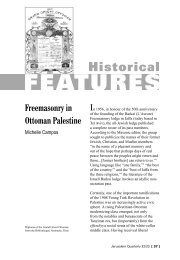
![In Search of Jerusalem Airport [pdf] - Jerusalem Quarterly](https://img.yumpu.com/49007736/1/180x260/in-search-of-jerusalem-airport-pdf-jerusalem-quarterly.jpg?quality=85)
